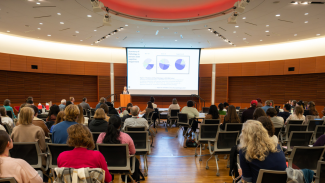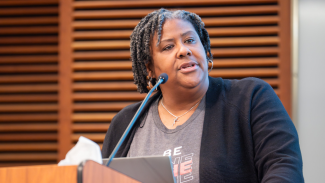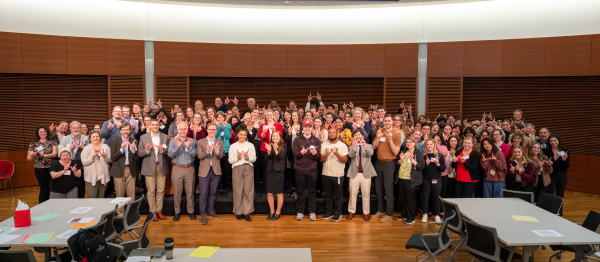
The Wisconsin Alzheimer’s Disease Research Center (ADRC) hosted its annual Alzheimer’s Disease & Related Dementias Research Day on April 22, 2025, at the Discovery Building on the UW–Madison campus. More than 300 people attended the event in person or online. Research Day was started in 2014 to encourage collaboration and promote scientific thought among faculty, students and researchers from a wide range of disciplines across the UW–Madison campus.
The Research Day poster session included 51 posters with 10 lightning presenters. A group of faculty members judged the posters to give out three awards. In-person attendees voted for two additional fan favorite awards during the event. The award winners were:

- Best Fellow, Post Doc, or Research Scientist Poster: Mintong Liu, PhD, “Association of Tau with Amygdala Emotional Reactivity, Recovery, and Ratings of Valence and Arousal in Alzheimer’s Disease Risk Populations”
- Best Graduate Student or Research Specialist Poster: Joanne Yee, MS, CCC-SLP, “Feasibility and Utility of Cough Function and Expiratory Pressure Measurement in Persons Living with Dementia”
- Best Undergraduate Student Poster: Caitlyn Miller, “Associations between depressive symptoms, Alzheimer’s disease biomarkers, and cognition in a cognitively unimpaired sample”
- Fan Favorite Poster Presentation: Sarah Scalzo, “Association of COVID-19 Positivity with Biomarkers of Alzheimer’s Disease and Cognitive Test Performance”
- Fan Favorite Lightning Presentation: Yang Yeh, PhD, “High and Low Dietary Protein Intake in Alzheimer’s Disease”
Recordings of the featured and lightning presentations can be found on our Research Day 2025 webpage or our YouTube page.
Presentations
Research Day opened with a featured talk from Bradley T. Christian, PhD, professor of medical physics and psychiatry and director of PET Physics at the Waisman Brain Imaging Lab. His talk, “The Natural History of Amyloid PET Research at the UW ADRC,” chronicled UW’s amyloid research, especially as it pertains to Down syndrome and its link to Alzheimer’s disease
Julie A. Schneider, MD, MS, neuropathologist and professor at Rush University’s Department of Neurological Sciences, presented “Looking Beyond Alzheimer’s: The Rise of LATE and Other Hidden Pathologies.” Schneider’s presentation highlighted how Limbic predominant Age-related TDP-43 Encephalopathy (LATE) and other pathologies affect the brain, and the importance of researching these pathologies.

Gina Green-Harris, MBA, gave the final featured presentation. She is the director of the Wisconsin Alzheimer’s Institute Regional Milwaukee Office, and the director of the UW School of Medicine and Public Health Center for Community Engagement and Health Partnerships (CCEAHP) in Milwaukee. Green-Harris’s presentation, “Creating Sustainable Community Partnerships in AD Research,” discussed strategies for community outreach and engagement in the research field.
Ten abstract submissions for the event’s poster session were selected to give oral abstract presentations:
- Yang Yeh, PhD, “High and Low Dietary Protein Intake in Alzheimer’s Disease”
- Aaron Fredricks, BS, “Proteomics at our fingertips: Coupling remote collection devices with NULISA multiplex panels”
- Ikenna Odoh, MD, “The Association of Cardiorespiratory Fitness with Rates of Cognitive Decline in a Multiethnic Cohort at Risk for Alzheimer’s Disease”
- Olivia Goulette, BA, “Associations Between Self-reported History of Traumatic Brain Injury on Longitudinal Cognitive and Speech Changes Linked to Alzheimer’s Disease Risk Factors”
- Jovana Jovanovska, BA, “Characterizing Age at Onset of Alzheimer’s Disease Using Polygenic Risk Scores: A Multi-Ancestry Perspective”
- Virginia Mathu, BS, “Visual Function in Comorbid Mouse Models of Alzheimer’s Disease and Glaucoma”
- Samriddhi Dube, BSc, “Longitudinal Plasma pTau217 Measurements in Preclinical Alzheimer’s Disease”
- Isa Hayde, undergraduate student, “A Step Ahead: PET Scans and Personal Action”
- Vaibhav Vemuganti, MS, “Gut bacteria derived imidazole propionate potentiates Alzheimer’s disease”
- Jennifer Landeta Vidal, MPH, “Education to improve primary care dementia diagnosis and care: The Wisconsin Alzheimer’s Institute
Before their presentations, Dr. Yang Yeh and undergraduate student Isa Hayde joined the Dementia Matters podcast to discuss how the Research Education Component (REC) has impacted their research journeys. Listen to the episode on our website or wherever you get your podcasts.

-By Alexia Spevacek



